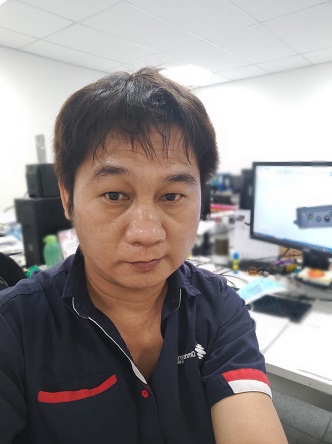
Ng Junn Howe
"Once a designer, always a designer." - Junn Howe
Could you briefly share with us your current career portfolio as a Mechanical Design Engineer at Omnisense Systems Pte Ltd?
The main core business of Omnisense Systems is thermal camera and screening system. I joined in June 2018 and was involved in projects such as designing a marine exhaust cleaning system, which requires intense manual calculation for sea water to exhaust gas volume ratio as there is no software for this system at the moment. Currently, I’m working with the design of thermal cameras.
What drove you towards a career as a Mechanical Engineer in the shipping industry?
I was a junior ship navigator inmy younger days. Later on, when I started land-based work, I was exposed to ship surveying as well as ship maintenance and repair at the shipyard. This involved some engineering work which drove me towards an interest in marine propulsion systems.
What are some of the biggest challenges you face in your career and how do you overcome them?
In 2000, the marine industry faced a decline and I was out of a job for two months. But subsequently, I joined a marine manufacturer company, as recommend by an ex-colleague.
The challenges that I faced over the years are related to the compliance of classification rules, especially those from the International Association of Classification Societies. Certain designs have to be amended in order to comply with these rules and not all ships are the same.
The accomplishment I’m most proud of is being exposed to and designing in-depth marine propulsion systems. There are many configurations found in the vessels, but I ensure that they well-managed.
What made you study the Bachelor of Engineering with Honours in Mechanical Engineering at PSB Academy? How did this programme help you to make a difference in your career?
In my mid-20s, I had the intention of furthering my studies in Naval Architecture, but it is only available overseas. While I was working in a Singapore-based shipyard, I was told that a mechanical engineering degree with some marine exposure was a good start. At that time, I had just gotten married and so I brushed aside this intention due to family commitments.
While I was working in the marine propulsion company, the job had stable working hours, therefore I considered furthering my studies again. My spouse and elder sibling encouraged me to go for it and after doing some research, I chose PSB Academy. Some of my favourite subjects are Solid Mechanic and Dynamic as well as Analytical Modelling, which are also applicable to my work.
What advice can you give to our graduates taking a similar career path?
Do not throw away your lecture notes and forget calculus mathematics. You might need it in the future, especially if you are working in Mechanical Design. During my years in the marine industry, there were many calculations in which I’ve had to refer to my lecture notes. Examples include Bernoulli Equation, strength of Materials, Dynamics and Fluid mechanics. Do take note that there are many local companies that would require you to know these equations and do manual calculations.
There is a saying, “once a navigator always a navigator”. If you apply it to a technical role, it would be, “once a designer, always a designer”. Although technology has advanced very drastically, we have to know the basic foundation as an engineer.




 TOP
TOP
